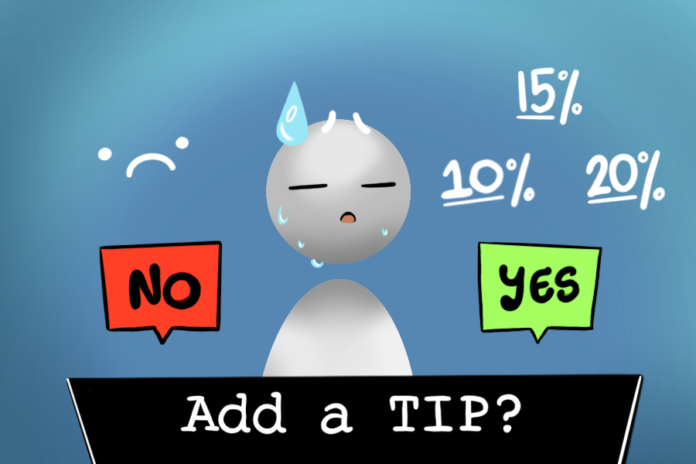The social phenomena that has people doubting their own morality
By MAYA KORNYEYEVA — mkornyeyeva@ucdavis.edu
You’re standing at a counter, waiting to pay for your large iced chai. The price totals to $5.50, and you shrug off the nagging voice telling you to go make your own chai to save money.
The barista smiles at you, prompting you to insert your credit card. You do so and wait, only to realize your payment isn’t going through… there’s a question on the screen. It asks, “Add a tip?” Suddenly, your world implodes.
You can’t figure out what to do. On the one hand, you’ve got to look out for yourself: there’s no denying you’re broke. On the other hand, what’s an extra dollar if it helps the barista earn a liveable wage? You sigh, knowing that you would feel guilty the rest of the day for not leaving a tip, and click the suggested 15%.
This social concept of tipping is an immense part of the restaurant and service industry. There’s something morally ambiguous about tipping; it is not technically mandatory, but many companies structure their wage systems in such a way that not tipping would essentially be taking money from the servers. Many restaurant staff have hourly wages of just $2.13, relying on luck and generous tippers to make ends meet.
Thus, it seems to me that the very convention of tipping raises ethical questions and is, in itself, exploitative. Relying on a customer’s kindness is a stressful and unstable situation for a minimum wage worker to be in, since multiple factors affect tipping, including the customer’s mood, the server’s behavior, the atmosphere in the restaurant and even the weather.
It is also important to consider the financial situations of buyers — many are already stretched thin and can’t afford to tip, leaving them feeling as though they committed an immoral action when unable to.
As a minimum-wage barista myself, tips are definitely a substantial part of my income. However, I sympathize with the pressure that is felt by customers. Online and credit card tipping in particular is a relatively new development and is harder to avoid than simply leaving a few coins in the tip jar. Moreover, there’s an added psychological weight of the barista or server watching you “skip the tip.”
In our current economic climate, prices for consumer goods are steadily rising, and with it, the inability of many individuals to tip. I argue that now, more than ever, we need to refine or completely eliminate the tipping system, modifying wages to remove workers’ dependence on freely given bonuses. It is a reality that there exists a “tipping bias;” men are generally tipped more than women, and white individuals more than minorities. There’s also a bias in terms of beauty and aesthetic appeal.
Removing the tipping practice can also hold employers accountable. Rather than depending on the customer to pay their staff — a concept that is neither fair to the customer nor to the employee — restaurant management should pay a liveable wage from the get-go.
Many other countries have successfully achieved this standard; in fact, there is quite a culture shock for many foreigners who visit the U.S. and are asked to leave a large tip. For example, a customary tip of just 5-10% is all that is necessary in the Netherlands and Portugal. Other countries like Singapore and Japan include gratuity costs in the bill, with a tip considered unnecessary and even impolite.
At the end of the day, there’s a lot to be explored within the tipping practice. Tipping affects us in innumerable ways, making us question the philosophical concepts of duty and obligation and feel a form of psychological dissonance created by being put on the spot. I firmly argue that tipping has negative consequences on consumers and employees and only a few positives that can easily be replicated through the installation of a fair wage.
So when you’re at the counter waiting for your iced chai or thanking a restaurant worker, keep in mind that, while tipping is currently customary, it doesn’t have to be. Large-scale reform and a joint effort from both minimum wage earners and consumers is necessary to create a more equitable compensation system.
Written by: Maya Kornyeyeva — mkornyeyeva@ucdavis.edu
Disclaimer: The views and opinions expressed by individual columnists belong to the columnists alone and do not necessarily indicate the views and opinions held by The California Aggie.











